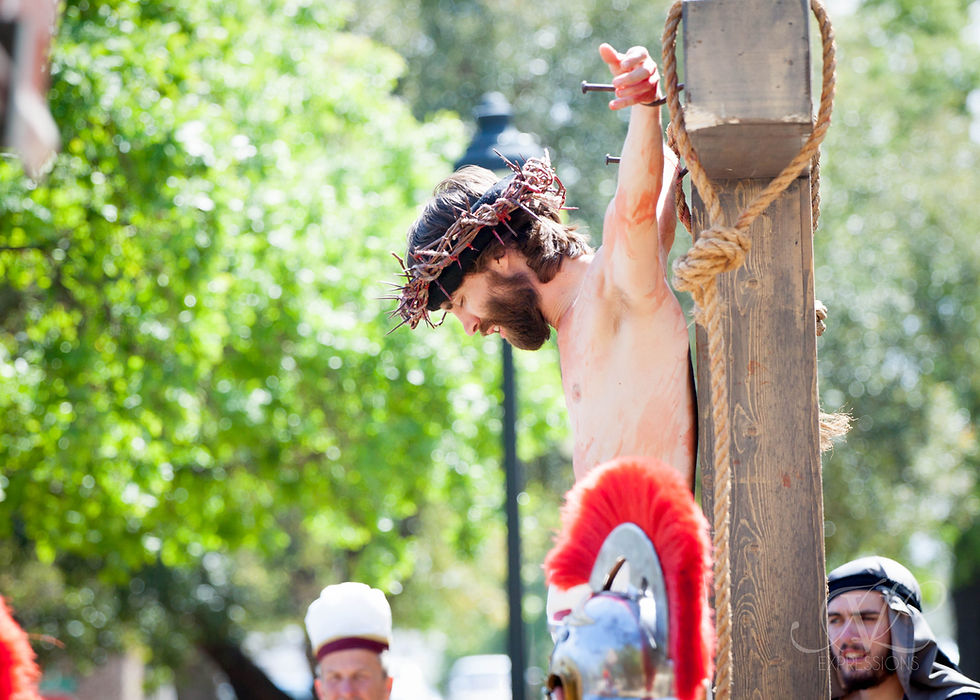"I wash my hands of this"... (part 2 of 2)
- Pageant Leadership

- Apr 10, 2020
- 3 min read
Yesterday, we looked at Peter, the impetuous disciple whose fear led him to deny Christ. During Christ’s ordeal that night, another man emerges on the stage. But not just any man: Pontius Pilate. A man of great position. He was Governor (procurator) of Judea. Summoned from sleep for this scurious night trial, Pilate was already on edge. It didn’t help that the current political climate was volatile, at best. Pilate was most likely living at the Praetorium at this moment to keep order in Jerusalem since it was Passover. His home during the rest of the year was in northern Israel in Caesarea.

He was awakened to make a judgment against a peaceful-looking itinerant Rabbi. Pilate is quickly convinced of this Man’s innocence. Observe Pilate’s diversion tactics to the religious hate-mongers outside:
Pilate says “I find no fault in Him” at least 3 times. (Jn 18:38; 19:4,6)
Pilate orders him to be flogged, hoping to appease their cries for punishment. (Jn 19:2)
Pilate presents Him in front as “The man” (not the king) to convince them of His humility (Jn 19: 5)
Pilate compares Jesus to the hardened criminal Barabbas, offering Jesus instead for a release, but to no avail. His contrasts fall on deaf ears. (Mt 27:17)
He sends Jesus to Herod for sentencing, hoping to pass off the sentencing. (Lk 23:6-12)
Nothing works. So Pilate cowers. He “washes his hands” in the matter as a symbolic, yet futile gesture. The religious (but not Godly) crowd has screamed “His blood be on us and on our children.” At this point in the Resurrection Pageant, I recall a freeze frame… a disconnect.
As people around me shout “Crucify Him” I am shocked. Shivers run up my spine. Part of me wants to tackle them, even though I know they are actors immersed in a scene. The other part of me screams out silently “How could you?” And then I look at powerful Pilate and a somber realization comes over me. It doesn’t matter if you actively attack Jesus or simply (like Pilate) prefer the comfort of power or prestige over His all-consuming Friendship. The result is the same. As John would later say “He who has the Son has life. He who does not have the Son does not have life” (I Jn 5:12).

So ignoring Jesus’ Divinity and his wife’s specific warnings, Pilate orders Jesus crucified. This man of position gets his name in the history book not because of civil or military strength, but because of a cowardly decision to preserve his political path and not upset the populace. So he effectively kills the only One who could save him. Jesus’ soft and gracious answers to Pilate reveal a Savior who wanted to do just that. Looking into Pilate’s tired and confused eyes, He even said that those who handed Him over to Pilate were guilty of a greater sin. What compassion in the midst of suffering!
Pilate’s heart was stirred by Jesus, but not enough to do the right thing. Like Peter, Pilate encountered Jesus. Both men’s characters were tested quickly. Like Peter, Pilate saw the suffering Jesus and was moved. Peter and Pilate both made excuses. They both ended up turning their backs on Him when He needed them most. But one crucial difference: Whereas Peter ran to the resurrected Jesus...Pilate ran away. His life, from all we can tell, ended in shame and guilt. Some reports say that just three years later, Pilate was removed from office for another cowardly decision and committed suicide shortly thereafter.
I am so thankful for a Savior that chased after the most unlikely of men, from a lowly and impetuous fisherman to a powerful Roman governor. He loved them both equally. As Christ’s character is still on trial today in the hearts of people around us, will you be a Peter or a Pilate?
Written by Travis Patterson Pastor for Family and Children's Ministries Keene Seventh-day Adventist Church





Comments